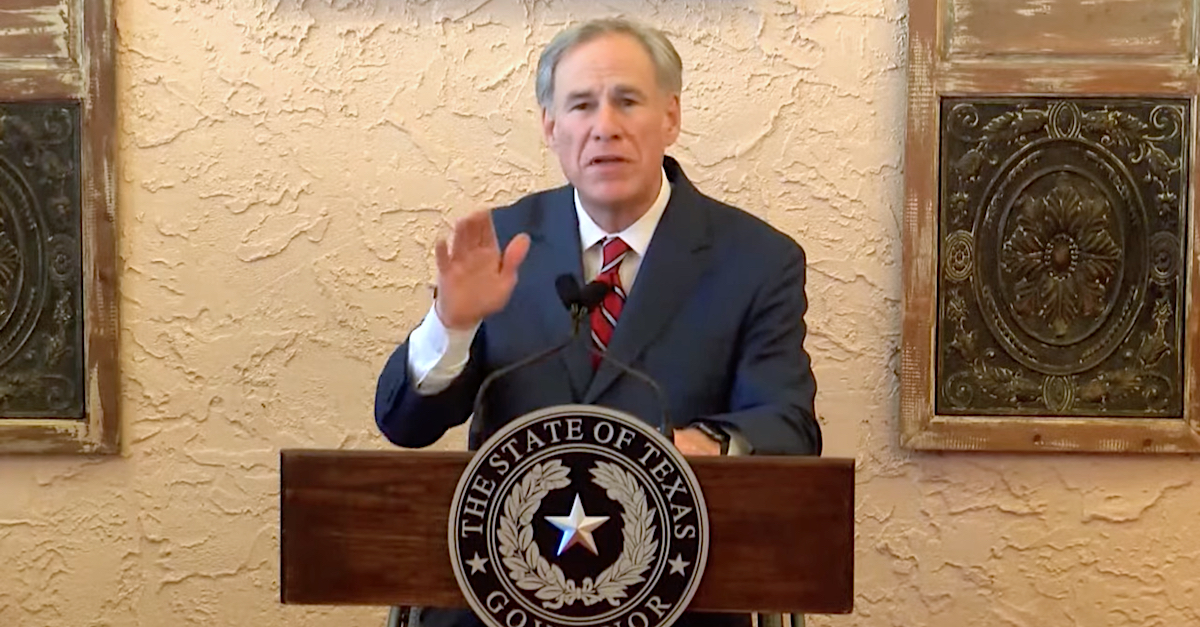
Texas Gov. Greg Abbott
A trio of Republican-appointed federal appellate judges on Friday declined to block Texas from enforcing its controversial new anti-abortion law, citing the same rationale as the Supreme Court’s right flank for why the so-called “heartbeat” law’s design shields it from attack.
Two Donald Trump appointees—U.S. Circuit Judges Kyle Duncan and Kurt Damian Engelhardt—and Ronald Reagan-installed U.S. Circuit Judge Edith Hollan Jones of the conservative Fifth Circuit joined the per curiam order.
In a 19-page ruling, the panel left in place an order that paused a lawsuit filed by a coalition of abortion providers challenging the measure from proceeding at the federal district court level pending an expedited appeal.
Just like the conservative wing of the Supreme Court in a recent 5-4 ruling, the Fifth Circuit’s panel found that the lawsuit was aimed at government officials who are not responsible for enforcement of the law.
The measure in question—S.B. 8—which was signed into law by Gov. Greg Abbott (R) in May, bans abortions approximately six weeks into a pregnancy, before most women are even aware that they are pregnant.
As previously reported by Law&Crime, S.B. 8 has insulated itself from legal challenges through an attenuated method of enforcement. Unlike most laws, which are enforced by the government, S.B. 8 creates a private cause of action and monetary reward incentivizing private citizens to bring lawsuits against any person who “aids or abets the performance or inducement of an abortion, including paying for or reimbursing the costs of an abortion through insurance or otherwise [..] regardless of whether the person knew or should have known that the abortion would be performed.”
The American Civil Liberties Union has described it as a “bounty hunting scheme,” designed to frustrate constitutional attack.
The Supreme Court’s dissenters—with Chief Justice John Roberts joining the traditionally liberal wing—described the “not only unusual, but unprecedented” statutory scheme as a dodge to avoid court oversight.
Thus far, that insulation has succeeded for the Texas law’s designers.
Because the law is effectively enforced by private citizens as opposed to elected officials, the typical approach to having a judge block the law by suing the government was not available for the plaintiffs. Instead, the suit named as defendants various state officials and agencies and one private citizen—Mark Lee Dickinson—described in the complaint as being “deputized to bring S.B. 8 enforcement actions under color of state law.”
The Fifth Circuit found that the state officials—all judges in the state with jurisdiction over the newly created civil actions, as well as all court clerks that collect fees for civil actions, several state medical officials, and Texas Attorney General Ken Paxton (R)—had sovereign immunity under the Eleventh Amendment because the statute is “enforced exclusively” through private civil lawsuits.
“This language could not be plainer,” the ruling states. “Confirming that none of the State Defendants has an ‘enforcement connection’ with S.B. 8 is not difficult in light of the statute’s express language and our case law. To begin, the Texas Attorney General has no official connection whatsoever with the statute. No enforcement power means no enforcement power.”
The court added that it may not have jurisdiction to rule on the merits of the lawsuit’s claim that S.B. 8 unconstitutionally violates a woman’s right to have an abortion prior to fetal viability until there is an actual lawsuit brought under the measure.
“We are not blind to the ‘serious questions regarding the constitutionality of the Texas law at issue.’ We are also mindful of the real-world effects while courts resolve these vexing procedural questions,” the court wrote. “But we point out, as did the Supreme Court, that potential S.B. 8 defendants will be able to raise defenses before state courts that are bound to enforce the Constitution. Nonetheless, for a federal court to proceed to the merits without certainty of jurisdiction would threaten to grant unelected judges a general authority to conduct oversight of decisions of the elected branches of Government.”
Whole Women’s Health, one of the plaintiffs to the lawsuit, declined to comment. The ACLU Texas chapter, which filed the suit, did not immediately respond to an email from Law&Crime seeking comment.
Read the full ruling below:
[image via WFAA-TV/YouTube]